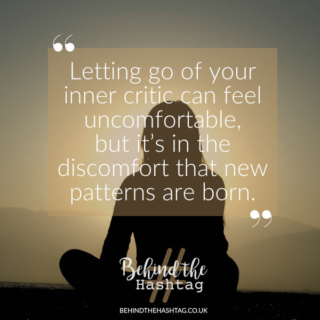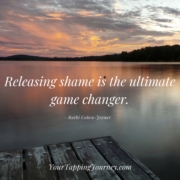Is there a harsher judge than the inner critic?
Our inner critic is a very familiar voice. Narrating inside out heads for as long as we can remember. And it’s a sneaky rascal because we often mistake the voice for intuition. Over the years as I’ve really paid attention – thanks to mindfulness and meditation – to both my inner critic and intuition, one pattern helps me tell the difference.
The inner critic will often say “You CAN’T do that”, whereas intuition is more likely to say “You SHOULDN’T do that”. A very important difference, I’ve found.
Very recently, I had the exciting opportunity to do a Facebook Live session at the invitation of my friend and mentor Jessie. One of the questions he asked has really stayed with me – “How do you stop self-judgment?”
Speaking for myself, I’m not sure stopping is feasible. Self-judgement is undoubtedly the essence of the inner critic – and when I imagine stopping it, I immediately envision a ‘Game of Thrones’ type battlefield… carnage!
When I started regularly practising mindfulness a few years ago, the first difficult thing for me was the “noticing”. It’s when I began to really pay attention to the voice of the inner critic, what it was saying and when it would be saying it. The essence of mindfulness is actually to stop the fight. So as I’ve reflected on the question over the subsequent weeks, I think my much shorter, crisper answer now would be – “You don’t focus on stopping it. You focus on understanding where it’s coming from.”
There is an inner voice we all have, which keeps us going – it motivates us. Once we start to understand if the voice is coming from a place of motivation, from a positive place, it can be wonderful “self-talk”. Before I understood more about all this, I used to call it “having a word with myself”. It shouldn’t be harsh, it should feel like something you would say to a friend – nudging them with kindness.
 It’s the darker inner voice that is our critic. The voice that’s based on our “big assumptions”, the stories we’ve created over the early part of our lives and then spend the later part of our lives unpacking with coaches, trainers, mentors and gurus of all descriptions. Or maybe that’s just me? Every time I’ve done some personal development work, there’s almost always another big assumption uncovered.
It’s the darker inner voice that is our critic. The voice that’s based on our “big assumptions”, the stories we’ve created over the early part of our lives and then spend the later part of our lives unpacking with coaches, trainers, mentors and gurus of all descriptions. Or maybe that’s just me? Every time I’ve done some personal development work, there’s almost always another big assumption uncovered.
A damaging assumption I discovered a few years back was due to something my a high school maths teacher had said to me many moons ago. My older brother has always been incredibly bright and was phenomenal at maths in school. I had the same maths teacher too and a few weeks into the term he asked me, “Are you adopted by any chance?”. A great example of one ‘big-ass assumption’ getting handed on a platter to my inner critic, “You’re not clever enough” subsequently played on a loop in my head for years.
So what do we do with this then? If we’re not going to fight it or try and stop it – is the inner critic the equivalent of a freight train coming at us and we’re just going to stand on the tracks? Definitely not – first of all let’s make it less of a monster by realising EVERYONE has an inner voice. What we’re watching for is darkness in that voice, something toxic that we need to counter.
Affirmations can be a gentle way of balancing out the inner critic. To be honest, I felt a bit silly when first started using affirmations – I was a little dismissive of them. Until I reframed how I thought about them.
Use them as if you were talking to a friend. If I have someone in my life who doesn’t believe in themselves, I’ll often repeat the same positive messages to them. I know instinctively they won’t believe it the first time or maybe second, third, fourth or even the fiftieth – but in time it should sink in. It’s the same with positive affirmations, this time you’re saying them to yourself, and you need to keep the same repetitive rigour. Try it!
The first simple step you can take is to handling your inner voice is just to begin noticing and jot down any negative messages you become aware of. For example, I’ve had a couple of emails this week, which triggered my inner critic – thankfully, I noticed early so took the time to jot down the narrative that was bubbling up. Luckily for me, I’ve been focusing on some personal development work this week, which has allowed me to unpack these negative messages with trusted colleagues. It does take work, but the benefits are significant.
So, rather than suiting-up to do battle with your inner critic and worrying about how to stop self-judgment, maybe it’s time to tune-in and listen – sit with the voice and learn over time to balance it out.
What are you telling yourself you “can’t do”? Maybe you can change the story.
Next Steps
35 Positive Affirmations to Add to Your Daily Rotation.










Leave a Reply
Want to join the discussion?Feel free to contribute!